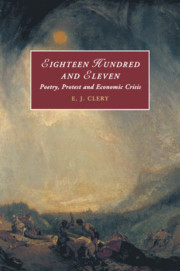'Clery's subject is Anna Letitia Barbauld’s poem 'Eighteen Hundred and Eleven', published in February 1812 as an attack on the British government’s policies, particularly, according to Clery, the Orders in Council of 1807 limiting trade. … Recommended. Upper-division undergraduates through faculty.'
J. Rosenblum
Source: Choice
'E. J. Clery aims definitively to put to rest the myth about Barbauld’s sensitivity to criticism; to rehabilitate her image; and to offer a new interpretation of the poem as a response to specific economic problems and part of a successful effort to force the government to address them … this illuminating case study is able to give a detailed account of the year 1811 as well as of its namesake poem.'
H. J. Jackson
Source: The Times Literary Supplement
'The book is a game-changer not only in its account of the strategies and distinctiveness of Barbauld's poem but also in painstakingly elucidating how a poem actually changes political-cultural realities … It will appeal to scholars interested in Barbauld and/or women writers; in the Dissenting community and, especially the Aikin-Barbauld circle; in connections between economic and poetic debates and practices in the Romantic era; in the literary-political culture of Britain from 1808–12, including the impact of periodical reviews … Clery's Eighteen Hundred and Eleven is a bold book that is true to the spirit of Barbauld's poem in not only showing how but also believing that a literary work engages times of crisis with an efficacy that acknowledges the power of public fantasies and reasoned debate in shaping daily reality.'
Julie Carlson - University of California, Santa Barbara
'E. J. Clery’s passionate and well-researched study on Eighteen Hundred and Eleven is the work that Anna Barbauld’s long neglected 334-line poem deserves … Clery writes with conviction and verve; this is a work whose tone is con brio tracing the contexts of politics and economy in the years surrounding the writing of the poem, but its aims are more wide-ranging than this ambitious re-evaluation of one work might suggest. Clery makes a case for rereading women Romantic poets’ work as something other than ‘narratives of defeat and disappointment, compromise and constraint’ as well as recognizing that they wrote in ‘collaboration and dialogue’ with men … E. J. Clery’s excellent book is highly recommended.'
Lisa Vargo
Source: The BARS Review
‘It is written like a detective novel, and certainly has the pace of one … a quiet triumph of staging and presentation, and deeply original not only for its specific argument, but in its narrative method … A model of how transformational a feminist resistance to the commonplaces of 'women’s history' (the usual narrative of silencing) can be.’
Source: The Rose Mary Crawshay Prize Committee
‘… articulated with sharply relevant and illuminating specificity - and, above all, with an enlivening commitment to Barbauld’s courage and distinction in summoning her readers to join the opposition against catastrophic imperialist war.’
William Keach
Source: The Wordsworth Circle
‘E. J. Clery has presented what will long stand as the definitive reading of the significance of the poem Eighteen Hundred and Eleven, a revisionist reading that calls conventional assumptions, beliefs, and interpretations into question.’
Elizabeth Kraft
Source: European Romantic Review
‘… Clery produces masterful scholarship, artistically crafted. This immensely satisfying book is a model of superb research and the most illuminating rendering to date of the poem and its significance.’
Scott Krawczyk
Source: Keats-Shelley Journal





